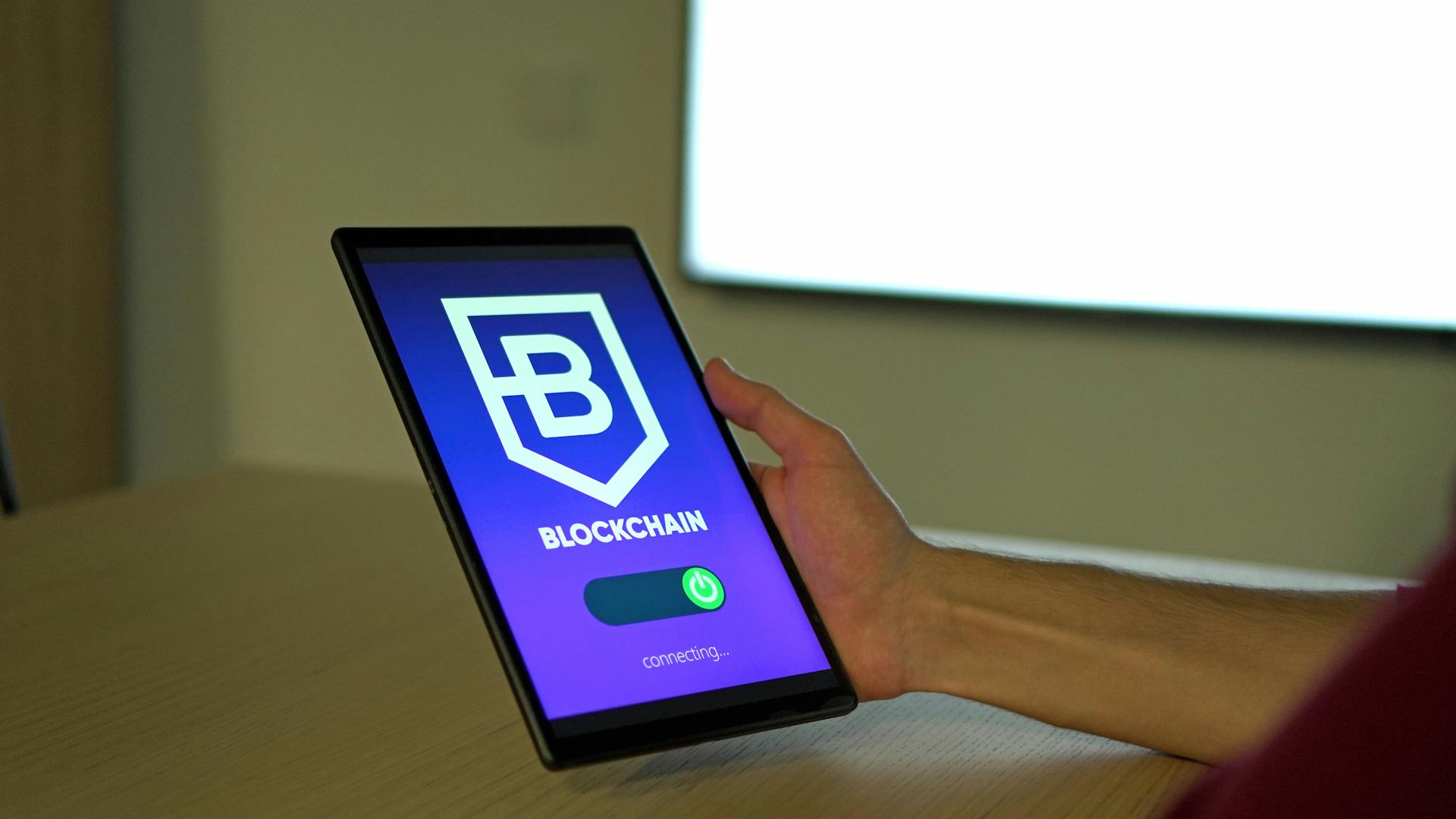
Delegated Proof of Stake is a consensus algorithm used by some blockchain networks, including EOS and Tron. It allows users to vote for a limited number of validators, known as block producers, to create new blocks.
In this system, users can delegate their voting power to trusted validators, who are incentivized to validate transactions and create new blocks. This approach is designed to provide faster transaction processing times and higher scalability compared to traditional Proof of Stake algorithms.
Validators are chosen through a process called voting, where users can vote for their preferred block producers. The validators with the most votes are then chosen to create new blocks and validate transactions.
You might like: Block Reward
What Is
Delegated Proof of Stake is a consensus mechanism that relies on a reputation-based voting system to achieve consensus on a blockchain network. Each user who holds the blockchain's coins has the ability to vote on which nodes are allowed to validate transactions.
Here's an interesting read: What Are Blockchain Smart Contracts
Voting power is based on how many coins a user stakes, with users who stake more coins having greater influence in determining which nodes are elected as delegates. Delegates are elected to validate transactions and earn block rewards.
The number of elected delegates varies greatly for each blockchain network, but all DPoS-based networks assume that the majority of elected delegates are honest. Honest nodes earn block rewards, while dishonest nodes are voted out and replaced in the next election.
Some DPoS-based networks use real-time reputation scores to show voters the honesty level of current and previously-elected delegates. Honest nodes with higher reputation scores stand a better chance of getting elected as a delegate and earning more rewards.
In essence, Delegated Proof of Stake is a way to address some of the flaws of previously-developed consensus mechanisms, and it has quickly gained widespread adoption from numerous well-known blockchain networks.
Here's a comparison between Delegated Proof of Stake and Proof of Stake:
How DPoS Works
Delegated Proof of Stake (DPoS) is a consensus mechanism that enhances the efficiency and scalability of blockchain networks while making the validation process democratic. Token holders vote for delegates, who take turns proposing and validating blocks of transactions.
The elected delegates are incentivized to act honestly and efficiently through rewards, such as transaction fees or newly created cryptocurrency. Witnesses behaving maliciously or failing to fulfill their duties face penalties, including a temporary suspension from the delegate role.
In DPoS, the number of elected delegates varies greatly for each blockchain network, but the majority of elected delegates are assumed to be honest. Voters have a financial incentive to elect delegates who act in the best interest of the network, and dishonest nodes will be voted out and replaced by honest nodes in the next election.
Key Components of DPoS:
How DPoS Works
Delegated Proof of Stake (DPoS) is a consensus mechanism designed to enhance the efficiency and scalability of blockchain networks. It's a democratic process where token holders elect delegates to validate transactions and produce blocks.
In DPoS, the consensus process involves a set number of witnesses or delegates elected by token holders through a voting mechanism. Token holders cast their votes based on the amount of cryptocurrency they hold, and the chosen delegates play a pivotal role in validating transactions and producing blocks.
Token holders participate in the consensus process by voting for their preferred delegates, with the weight of a vote often proportional to the number of tokens the voter holds. This aligns the interests of token holders with the security and reliability of the network.
The rotation of delegates is a key feature of DPoS, where witnesses are periodically replaced or shuffled based on the voting results. This rotation prevents centralization of power, enhances network security, and provides opportunities for a broader set of participants to play a role in block production.
Delegates are incentivized to act honestly and efficiently through rewards, commonly transaction fees or newly created cryptocurrency. Witnesses behaving maliciously or failing to fulfill their duties face penalties, including a temporary suspension from the delegate role.
Here's a breakdown of the DPoS process:
- Token holders vote for delegates based on their cryptocurrency holdings
- Delegates take turns proposing and validating blocks of transactions
- Rotation of delegates occurs periodically based on voting results
- Delegates are incentivized with rewards for honest and efficient behavior
- Witnesses who behave maliciously or fail to fulfill duties face penalties
Transaction Time
Transaction Time is significantly shorter in dPoS compared to PoS. This is because dPoS blockchains maintain a small network of witnesses, typically between 20 and 100.
Having a smaller network of witnesses allows for faster verification of blocks. I've seen this firsthand in my own research, where smaller networks have consistently processed transactions faster than larger ones.
The small network of witnesses in dPoS means that it takes less time to verify a block of transactions. As a result, transactions are processed and confirmed much quicker than in traditional PoS systems.
Curious to learn more? Check out: How Long Do Robinhood Crypto Transfers Take
Advantages and Limitations
Delegated Proof of Stake offers several advantages, including efficiency and scalability. It streamlines the block validation process, leading to faster transaction confirmation times and higher throughput than Proof-of-Work systems.
DPoS reduces the environmental impact by eliminating the need for extensive computational power, making it a more energy-efficient consensus mechanism. This is a significant improvement over Proof-of-Work, which involves energy-intensive mining processes.
Recommended read: Bitcoin Mining Energy Consumption
The DPoS consensus mechanism allows token holders to participate in the selection of delegates through voting actively, striking a balance between decentralization and efficiency. Controlled participation ensures a more predictable and manageable network.
Token holders are actively engaged in the governance of the network, fostering a sense of community and shared responsibility. The voting process encourages ongoing participation and alignment of interests between the community and the blockchain's success.
However, DPoS also has its limitations, including a disincentive for small token holders. Wealthier participants may have more influence in the voting process, potentially leading to vote buying or the formation of voting cartels.
Some of the notable limitations of DPoS include:
- Disincentive for small token holders
- Potential for vote buying or the formation of voting cartels
- Potential for collusion among elected delegates
- Token holders with a small stake may feel less incentivized to participate in voting
- Potential for single points of failure due to the reliance on a small number of delegates
Advantages
Delegated Proof of Stake (DPoS) is a consensus mechanism that offers several advantages that make it an attractive choice for blockchain projects. DPoS streamlines the block validation process, leading to faster transaction confirmation times and higher throughput than Proof-of-Work (PoW) systems.
Worth a look: Bitcoin Atm Tampa - Coinhub
One of the key benefits of DPoS is its efficiency and scalability. This is achieved through the limited number of elected delegates, which enhances the scalability of the network. DPoS significantly reduces the environmental impact by eliminating the need for extensive computational power.
Token holders are actively engaged in the governance of the network through voting, fostering a sense of community and shared responsibility. This democratic governance model aims to strike a balance between decentralization and efficiency.
DPoS enhances security by limiting the number of validating nodes and rotating delegates through voting. Regular rotation of delegates prevents the concentration of power and mitigates the risk of collusion or malicious behavior.
Elected delegates are incentivized to act honestly and efficiently through rewards. This incentive structure encourages a competitive and reliable network.
DPoS provides faster transaction finality, meaning that once a block is added to the blockchain, the probability of it being reversed is extremely low. This feature is particularly beneficial for applications requiring quick and irreversible transactions.
Here are some key benefits of DPoS:
- Efficiency and scalability
- Reduced environmental impact
- Democratic governance model
- Enhanced security through node limitation and delegate rotation
- Incentivized delegates for honest and efficient behavior
- Faster transaction finality
DPoS also allows for easier upgrades and adjustments to the consensus mechanism without requiring a hard fork. This adaptability facilitates the evolution of the blockchain network in response to changing requirements or improvements.
Disadvantages

One of the main disadvantages of Delegated Proof of Stake (DPoS) is its tendency to centralize power in the hands of a few wealthy participants.
DPoS relies on a limited number of elected delegates or witnesses to validate transactions and produce blocks, which can lead to concerns about centralization.
This concentration of power can result in a small group consistently dominating the consensus process, undermining the decentralized nature of the blockchain.
Wealthier participants may manipulate the system by acquiring more tokens to influence the selection of witnesses, leading to vote buying or the formation of voting cartels.
Token holders with a relatively small stake might feel less incentivized to participate in voting, as their influence is limited.
This can lead to reduced decentralization as a significant portion of the community might not actively engage in network governance.
DPoS also introduces the risk of single points of failure, as a small number of delegates are responsible for validating transactions.
For more insights, see: Bitmain Technologies Georgia Limited

If a group of delegates colludes or forms alliances, they may compromise the integrity of the blockchain by acting in their collective interest rather than the network's well-being.
Token holders may become apathetic toward the voting process, leading to a situation where a small portion of the community actively participates in selecting witnesses.
This can impact the fairness and representativeness of the consensus process.
Here are some of the potential drawbacks of DPoS:
• Potential for collusion
• Potential for single points of failure
• Risk of vote buying or the formation of voting cartels
• Reduced decentralization due to limited participation
• Dependence on the reputation of witnesses
• Complexity in decision-making processes
Here's an interesting read: Bitcoin Atm Milwaukee - Coinhub
Mechanisms and Processes
In a delegated proof of stake system, consensus mechanisms play a crucial role in ensuring the security, reliability, and integrity of transactions.
Consensus mechanisms determine how agreement is reached among nodes in the network, ensuring that transactions are validated correctly.
They enable decentralized systems for validating data entered into blockchain ledgers, making the network less reliant on central authorities.
For another approach, see: Bitcoins Transactions per Second
Blockchain Mechanisms
The choice of consensus mechanism plays a pivotal role in shaping the characteristics of a decentralized network. It determines how agreement is reached among nodes in the network, ensuring the security, reliability, and integrity of transactions.
Consensus mechanisms like Proof-of-Work require would-be validators to commit their computing power to the network. On the other hand, Proof-of-Stake allows validators based on their willingness to lock an amount of cryptocurrency on the blockchain.
Delegated Proof-of-Stake (DPoS) is another variant of staking that borders on speed and scalability. It sets up infrastructures that open the transaction validation system to the entire network, allowing the average user to vote for representatives that will take up validation-related tasks on their behalf.
There are several protocols designed to enable blockchain consensus, including Proof-of-Work, Proof-of-Stake, Delegated Proof-of-Stake, Nominated Proof-of-Stake, Proof-of-Authority, Proof-of-Time, and Proof-of-Validation.
Here's a brief overview of some popular consensus algorithms:
Consensus protocols implement and manage systems for randomly picking validators responsible for adding new transactions to the blockchain. They also incentivize participants to work in tandem with the goals of the blockchain at large, rewarding activities that contribute to the security of the ecosystem.
A different take: Stacks Blockchain
Block Creation

Block creation is a crucial process in blockchain technology.
In a PoS protocol, validators are selected based on staking power, which means users must lock assets on the blockchain to become eligible.
This process can take a lot more time because any node operator can compete for the role of validators as long as they fulfill staking requirements.
In contrast, dPoS enables a democratic system where token holders elect validators, making block creation time usually shorter.
This is because dPoS assigns transaction verification roles to a handful of participants, streamlining the process.
For more insights, see: What Was Bitcoins All-time High
Proposed CD-DPoS Algorithm
The Proposed CD-DPoS Algorithm is a consensus mechanism designed to ensure the security and integrity of transactions in a decentralized network. It's based on a voting system where nodes can vote for multiple alternative nodes, and each node's reputation value is calculated based on the number of votes cast for it.
In the CD-DPoS algorithm, the node voting graph is divided into communities using the GN algorithm, and each community's voting enthusiasm, or Q value, is calculated. This Q value represents the voting enthusiasm of the nodes in each community.
If this caught your attention, see: Bitcoin Chart History
The algorithm selects representative nodes to generate blocks by considering each node's voting enthusiasm and reputation value. These representative nodes are chosen based on their ability to generate blocks and their reputation within the network.
Here's a breakdown of the CD-DPoS algorithm's key components:
- Reputation value calculation: Each node's reputation value is calculated based on the number of votes cast for it.
- Community formation: The node voting graph is divided into communities using the GN algorithm.
- Block generation: Representative nodes are selected to generate blocks based on their voting enthusiasm and reputation value.
- Credit incentive mechanism: Nodes are rewarded or penalized based on their behavior, with successful block generation earning a credit value.
The CD-DPoS algorithm offers a unique approach to consensus mechanism, one that prioritizes voting enthusiasm and reputation value in selecting representative nodes. By doing so, it aims to create a more secure and reliable decentralized network.
Delegates and Voting
Delegates in a DPoS blockchain are core elements of the network's governance. They propose changes that would shape the future of the blockchain network, which are then put up for a vote by all participants who have staked the network's native token.
Delegates are elected through a voting process where users assign their voting power to them based on the number of native tokens they have staked. In some cases, stakers can transfer their voting power to other users instead of voting directly for a validator node.
Consider reading: Blockchain LLC
A key aspect of delegates is their responsibility to propose changes that benefit the network, not just themselves. Users must be truly interested in the rightful governance of the network and vote for delegates that they believe will make a contribution.
Here are the different roles involved in the voting process:
- Stakers: assign voting power to delegates based on the number of native tokens they have staked.
- Delegates: propose changes that shape the future of the blockchain network.
- Users: vote on proposed changes and assign voting power to delegates.
Voting Power Concentration
In DPoS, a few wealthy users still control the network indirectly, as they have more voting power in delegate elections due to staking more coins.
Users who stake more coins earn a larger percentage of block rewards that delegates distribute to their voters.
Concentration of voting power is a concern in DPoS, as it allows a small group of users to influence the network.
Stakers can transfer their voting power to other users, giving them more flexibility in how they participate in voting.
Delegates
Delegates are core elements of the governance of DPoS blockchains, proposing changes that shape the future of the network. These proposed changes are then put up for a vote, open to all participants of the network as long as they have staked the network's native token.

Delegates are elected through a voting process, where users with more staked coins have more voting power. However, a few wealthy users still control the network indirectly, as they have more voting power due to their larger staking amounts.
In order to become a delegate, users need to have access to large amounts of funds and gain support from other users who are willing to stake the required funds for each delegate election. This means expenses for running a node are steadily increasing as the networks expands in size.
Delegates receive block rewards, which they can share among the stakers who voted for them. This incentivizes honest behavior and encourages delegates to act in the best interest of the network.
Here are some key characteristics of delegates:
- Propose changes to the network
- Put up for a vote by all network participants
- Receive block rewards for their work
- Must have access to large amounts of funds
- Must gain support from other users
In order to achieve successful decision-making and block validation, users must be truly interested in the rightful governance of the network and must vote for delegates that they believe will be able to make a contribution. This requires honesty and genuineness from all participants in the voting process.
Frequently Asked Questions
What is delegated staking?
Delegated staking allows users to pool their stakes with others, making it easier to participate in the staking process. This pooled stake is then managed by a designated entity, simplifying the staking experience.
Is ethereum delegated proof of stake?
Ethereum uses a proof-of-stake system, but it's not entirely delegated, as validators require a direct stake of 32 ETH
Sources
- https://tangem.com/en/blog/post/delegated-proof-of-stake-dpos/
- https://komodoplatform.com/en/academy/delegated-proof-of-stake/
- https://limechain.tech/blog/delegated-proof-of-stake-explained
- https://www.mdpi.com/1099-4300/25/9/1320
- https://coinmarketcap.com/academy/article/proof-of-stake-pos-vs-delegated-proof-of-stake-dpos
Featured Images: pexels.com


